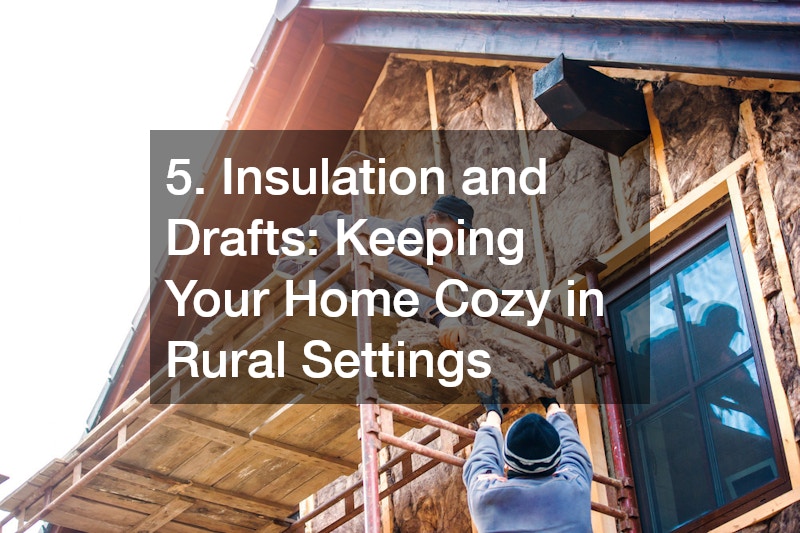Moving to the country is an exciting adventure that promises peace and a connection with nature. However, rural homes come with unique maintenance needs that require special attention. From septic systems to pest control, it’s crucial to ensure that key home systems are properly installed and maintained for comfort, safety, and long-term sustainability. By implementing effective rural living solutions, you can ensure your new home remains functional and comfortable. Here’s what to focus on when moving into a new rural home.
1. Plumbing Repairs: Fixing Leaks and Ensuring Water Safety

In rural homes, plumbing issues can be common due to older systems, well water, and the absence of municipal water services. Ensuring everything is working efficiently is key to preventing waste and potential water damage.
Inspecting for Leaks and Clogs
Leaks in the plumbing system are a common issue, especially in older homes. Over time, pipes can corrode, joints can loosen, and seals can deteriorate, leading to water waste and potential structural damage.
It’s important to regularly check all visible pipes, faucets, and water heaters for signs of leaks. Even small leaks can significantly increase water bills and, if left unchecked, can cause hidden damage to walls, ceilings, and floors. In rural areas, where plumbing systems may be older, these issues can be particularly troublesome.
If you encounter persistent plumbing problems, it may be wise to consult professional plumbing services to assess and repair the system before it leads to more serious issues.
Ensuring Safe Water Quality
If your home relies on well water, it’s essential to have the water tested regularly for contaminants. Unlike municipal systems, which typically undergo rigorous testing and treatment, well water is the homeowner’s responsibility to monitor. Contaminants such as bacteria, heavy metals, and chemicals like pesticides can make well water unsafe for consumption.
Regular testing helps identify harmful substances and ensures that your water is safe for drinking, cooking, and bathing. Installing a water filtration system can significantly improve the quality of well water, removing harmful contaminants and giving you peace of mind.
To ensure optimal water quality, consider consulting a water filtration service to install a system that meets your specific needs, providing clean and safe water throughout your home. By taking proactive steps to monitor and treat your water, you can protect your health and avoid costly plumbing issues related to water quality.
2. Electrical System: Powering Up Your Rural Home

Electrical systems in rural areas often differ from those in urban homes. The distance from power sources and frequent outages make it necessary to install backup power solutions and inspect wiring thoroughly.
Backup Power Solutions
Frequent power outages can be a common problem in rural areas. The distance from the main power grid, along with natural events like storms, can disrupt electrical service, leaving your home without power for hours or even days.
To avoid being left in the dark, consider investing in a whole-house generator or solar panels to ensure your home remains powered during emergencies. A whole-house generator provides an immediate source of power when the grid goes down, while solar panels can supply energy long-term, reducing dependence on the grid and providing sustainable energy. This is especially important if you’re living in an area with unstable or distant electrical grids, where power restoration can take longer.
An electrical contractor can help you assess your backup power needs and recommend the best solution based on your home’s specific requirements.
Wiring and Voltage Control
Older rural homes may have outdated wiring, which could pose a fire hazard. If your home is more than a few decades old, it’s essential to have an electrical contractor inspect the system to ensure it meets modern safety standards. Outdated or worn-out wiring can lead to electrical failures, putting your home at risk.
Additionally, voltage fluctuations in rural areas can be a concern, as the electrical grid may not always provide a stable voltage. These fluctuations can damage sensitive electronics, like computers and appliances.
To prevent this, installing surge protectors and voltage regulators can help stabilize the current and protect your devices. Regular inspections and upgrades to your electrical system will ensure your home remains safe and efficiently powered.
3. Septic System: Ensuring Proper Waste Management
When you move to a rural home, especially one not connected to municipal sewer systems, installing and maintaining a septic system is crucial for waste disposal.
Understanding the Basics of Septic Systems
A septic system is designed to treat household waste and wastewater on-site. Unlike municipal systems, which rely on centralized treatment plants, a septic system handles waste within the boundaries of your property. This system consists of a septic tank, a drain field, and a series of pipes that allow for the disposal and filtration of wastewater. In rural areas, septic systems are the most common waste disposal method, as many homes are not connected to city sewer lines. The septic tank collects and holds solid waste, while the drain field filters out liquid waste into the soil, where it is naturally purified.
The key to a well-functioning septic system lies in proper installation and consistent maintenance. A well-maintained septic system can last for many years, but neglecting it can result in costly repairs, unpleasant odors, and potential health hazards. To ensure your system works efficiently, it’s important to monitor the tank’s condition, keep the drain field clear of obstructions, and avoid overloading the system with too much water or waste at once.
Maintaining Your Septic System
Regular septic pumping is essential to avoid problems with clogging and blockages. As solids build up in the tank, they can prevent proper wastewater treatment and lead to costly backups and system failures. Generally, septic tanks should be pumped every 3 to 5 years, but the frequency can vary depending on household size and usage. Larger households or homes with heavy water use may require more frequent pumping, while smaller homes with minimal waste might be fine with less frequent service.
In addition to septic pumping, it’s important to install risers to provide easier access for maintenance. Risers are vertical pipes that extend from the top of the septic tank to ground level, making it simpler to locate and maintain the system. This can save time and effort when pumping or inspecting the tank.
Another essential maintenance tip is to avoid flushing non-biodegradable materials, such as paper towels, diapers, or chemicals, as they can disrupt the natural breakdown process in the tank. If you’re building a new home, or replacing an old septic system, it’s worth investing in professional septic tank installation services to ensure everything is properly installed and meets local regulations. This will help prevent future issues and extend the life of your septic system.
4. HVAC System: Heating and Cooling in Rural Homes
Heating and cooling are essential in any home, but in rural settings, climate extremes often require more specialized HVAC solutions. Insufficient heating or cooling can make living in the country uncomfortable.
Installing Heating Systems
In colder climates, it’s important to install a reliable heating system to ensure comfort during the winter months. Options include traditional furnaces, heat pumps, and wood stoves, depending on your preference and the size of your home.
Furnaces are the most common choice, providing consistent warmth throughout the home, while heat pumps offer a more energy-efficient solution by extracting heat from the outside air, even in colder conditions. Wood stoves are ideal for those who prefer a more traditional approach or live in areas where firewood is abundant.
Make sure your heating system is appropriately sized for your home and regularly serviced to keep it running efficiently. Regular maintenance and timely HVAC repairs can extend the life of your heating system and prevent costly breakdowns during the coldest months.
Cooling Your Home in the Summer
In warmer climates, installing central air conditioning or a ductless mini-split system can ensure your home remains cool during the summer heat. Central air conditioning systems are ideal for larger homes or those with existing ductwork, providing even cooling throughout the home.
For smaller homes or those without ductwork, a ductless mini-split system is a more flexible and energy-efficient option. These systems consist of an outdoor compressor unit and individual indoor units, allowing you to control the temperature in each room. Ductless systems are easier to install and can be more energy-efficient than traditional central air conditioning.
As with heating systems, regular maintenance and prompt HVAC repairs will keep your cooling system functioning efficiently, ensuring you stay comfortable no matter the season.
5. Insulation and Drafts: Keeping Your Home Cozy in Rural Settings

Insulation is key to keeping your rural home comfortable year-round. Rural homes, especially older ones, may not be as well-insulated as those in urban areas, leading to energy inefficiency.
Evaluating and Upgrading Insulation
Start by checking your home’s insulation in the attic, walls, and floors. Older or insufficient insulation can result in higher energy bills and difficulty maintaining a comfortable indoor temperature, especially in regions with extreme weather conditions.
If your home has outdated or minimal insulation, upgrading to modern materials like spray foam or fiberglass batt insulation can significantly improve your home’s thermal performance. These materials are designed to provide better resistance to heat transfer, keeping your home warmer in the winter and cooler in the summer. Investing in improved insulation not only enhances comfort but also reduces energy consumption, ultimately lowering utility bills.
Preventing Drafts and Heat Loss
Air leaks around windows and doors are common culprits of energy loss. Gaps in these areas allow warm air to escape in winter and cool air to enter in the summer, making it harder to maintain a stable indoor temperature.
To address this, seal gaps with weatherstripping or caulk around your windows and doors. If your home is exposed to extreme temperatures, installing storm windows or adding insulation to doors can further reduce drafts and improve energy efficiency. Upgrading old or inefficient windows and doors to more energy-efficient models can also make a noticeable difference, preventing heat loss and improving your home’s overall comfort and energy savings.
6. Roof and Gutters: Protecting Your Home from Rural Weather

The roof and gutters are two critical elements that protect your home from the elements. In rural areas, exposure to severe weather like heavy rain, snow, and strong winds means that roof and gutter maintenance is essential for protecting your home.
Inspecting and Maintaining Your Roof
A well-maintained roof is essential for protecting your home from water damage and ensuring your home’s structural integrity. Regularly inspect your roof for missing shingles, leaks, or damage caused by weather. It’s especially important to look for damage after heavy storms or extreme weather events.
If you notice signs of wear, it may be time for a roof repair. Consider having a professional roofer inspect your roof periodically to ensure it’s in good condition and ready to withstand the unique challenges of rural weather. A timely inspection can help identify small issues before they turn into costly problems, keeping your home safe and dry.
Gutter Maintenance and Protection
Gutters are especially vulnerable to debris buildup from nearby trees, especially in rural areas with abundant foliage. Clogged gutters can cause water to overflow, potentially damaging your roof, siding, and foundation.
To prevent this, consider installing gutter guards to help prevent clogging, and make sure to clean your gutters regularly to ensure they stay in working order. Additionally, directing downspouts away from your foundation is crucial to avoid water damage and flooding. By keeping your gutters clear and well-maintained, you’ll protect your home from potential water damage caused by overflowing gutters.
7. Pest Control: Preventing Unwanted Guests
Living in the country means more interaction with wildlife and pests, including rodents, insects, and larger animals. It’s important to take preventative measures to avoid these unwanted guests and keep your home pest-free.
Sealing Entry Points
Start by checking for gaps and cracks around windows, doors, and the foundation where pests can enter. These small openings provide easy access for rodents and insects. Seal these entry points with caulk, expanding foam, or weatherstripping to prevent critters from making their way into your home.
Furthermore, inspect areas like attic vents and crawl spaces to ensure they’re secure. Proper sealing can help reduce the likelihood of an infestation and minimize the need for ongoing pest control efforts.
Managing Larger Pests
For larger pests like rodents or wildlife, it’s important to install mesh screens over vents, chimneys, and other potential entry points. These screens help keep animals like squirrels, raccoons, or bats from finding their way inside.
If you face a significant infestation, it’s advisable to consult a pest control company. A professional team can assess the situation, implement effective pest control methods, and ensure your home remains protected from unwanted guests.
In rural areas, termite prevention is also essential, as termites are common and can cause severe structural damage if left unchecked. Regular inspections can help detect early signs of termite activity, saving you from costly repairs.
In Closing
Living in the country offers many benefits, but it also requires specific considerations to ensure your home is functional, safe, and comfortable. From maintaining your septic system to ensuring clean water and controlling pests, taking the time to properly install and repair essential systems will help you enjoy your rural lifestyle for years to come. Whether you’re upgrading an older home or building a new one, these tips will guide you in making the right choices for a successful rural living experience.


